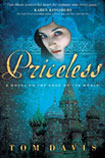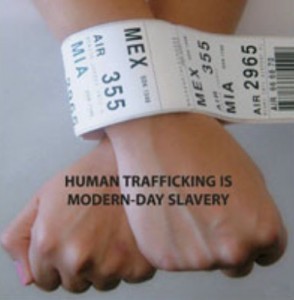 Wendy and I want to thank everyone who participated in the Change Their Story campaign, either by giving money or by becoming aware of the child sex slavery problem here in the United States and purposing to get involved in some way in the future.
Wendy and I want to thank everyone who participated in the Change Their Story campaign, either by giving money or by becoming aware of the child sex slavery problem here in the United States and purposing to get involved in some way in the future.
A special thanks goes out to my wife and three daughters, who gave up almost all of their Christmas gifts this year to put the money toward rescuing Russian girls caught in sex slavery.
And even though we reached our goal, you can still make a donation to help rescue young girls from sex slavery.
 Also, everyone who donated was put in a drawing for a free copy of Priceless, a book by Tom Davis which tells the story of rescuing girls from sex slavery in Russia. The winners of this free book are Johannes and Laura Rehm! We will get the book sent out to you.
Also, everyone who donated was put in a drawing for a free copy of Priceless, a book by Tom Davis which tells the story of rescuing girls from sex slavery in Russia. The winners of this free book are Johannes and Laura Rehm! We will get the book sent out to you.
Although the fund raising campaign is over, I will continue to make occasional blog posts about rescuing girls from sex slavery and what you can do to get involved. To keep informed, check the blog regularly, subscribe to get the posts by email, or subscribe in a reader (I recommend Google reader). I have an eye-opening post scheduled for next week called “I Want to Be a Prostitute.” I don’t personally want to be a prostitute, but you don’t want to miss this post.
To learn more about Human Trafficking and sex slavery, check out some of these posts:Human Trafficking Posts
- Sex Slaves
- Would You Fight Slavery?
- Rescue Russian Sex Slaves
- Rescue Russian Girls from Sex Slavery
- Stop Her Nightmare
- Another Girl Rescued Today
- Girls for Sale
- Goal Reached!
- I Want to be a Prostitute
- $52,000 raised!
- 31 Million Sex Slaves
- Renting Lacy
- More Than Rice
- Human Trafficking Ring Busted
- The Other Big Game
- Sex Slavery, Planned Parenthood, and Your Tax Dollars
- How to Minister to Prostitutes
- Wisconsin Woman Held as Sex Slave in Brooklyn
- Coked-Up Whore
- Human Trafficking has Many Faces
- Into an India Brothel
- You Need a Girl?
- Human Trafficking Media
- The Son of God is Selling Children
- My Girls Raised $300 to help stop Human Trafficking
- Rape for Profit
- Human Trafficking Statistics
- Help Rescue Girls from Forced Prostitution












 On Easter I wrote a post called
On Easter I wrote a post called  Several years ago, I wrote a post about an online movie called
Several years ago, I wrote a post about an online movie called  Furthermore, though we celebrate the birth of Jesus on December 25, few people believe he was actually born this day, nor does the Bible ever say that this is the day of His birth. The parallel is contrived.
Furthermore, though we celebrate the birth of Jesus on December 25, few people believe he was actually born this day, nor does the Bible ever say that this is the day of His birth. The parallel is contrived. Or let me approach this another way. Did you ever hear the story of a fancy ship that ran into an iceberg on its maiden voyage and sank as a result, killing more than half of the people on board because there were not enough lifeboats? No, I’m not talking about the Titanic. The name of the ship was the Titan, and this was the plot of a fictional novel called
Or let me approach this another way. Did you ever hear the story of a fancy ship that ran into an iceberg on its maiden voyage and sank as a result, killing more than half of the people on board because there were not enough lifeboats? No, I’m not talking about the Titanic. The name of the ship was the Titan, and this was the plot of a fictional novel called 




 Have you heard any of the uproar about the excessive, over-the-top Christmas tree put up by a luxury hotel in the United Arab Emirates? Widespread criticism has been directed at the hotel for erecting a Christmas tree worth over $11 million.
Have you heard any of the uproar about the excessive, over-the-top Christmas tree put up by a luxury hotel in the United Arab Emirates? Widespread criticism has been directed at the hotel for erecting a Christmas tree worth over $11 million.
 I love Christmas carols. I really do. I have many fond memories of singing carols in church while I was growing up, and listening to them in the house during the Christmas season.
I love Christmas carols. I really do. I have many fond memories of singing carols in church while I was growing up, and listening to them in the house during the Christmas season. Silent Night is another good example of a Christmas carol that present Jesus poorly. In talking about Jesus, it contains the words, “…radiant beams from thy holy face…”
Silent Night is another good example of a Christmas carol that present Jesus poorly. In talking about Jesus, it contains the words, “…radiant beams from thy holy face…”